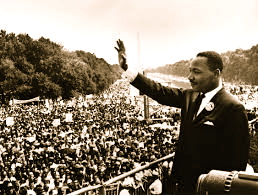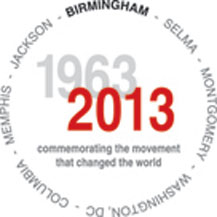Tens of Thousands Say Struggle for MLK’s “Dream” Continues

50 Years After March on Washington, Tens of Thousands Say Struggle for MLK’s “Dream” Continues
 Tens of thousands of people gathered in the nation’s capital on Saturday to mark the 50th anniversary of the March on Washington for Jobs and Freedom, originally held on August 28, 1963. People filled the National Mall as speakers reflected on the progress in achieving the goals outlined by the event’s most famous speaker, Rev. Dr. Martin Luther King Jr., who delivered his “I Have a Dream” speech from the steps of the Lincoln Memorial. We spend the hour featuring highlights from Saturday’s event, with voices including 13-term Georgia Rep. John Lewis, the only surviving speaker from the 1963 march; Rev. Jesse Jackson; Rev. Al Sharpton; Julian Bond, former chair of the board of the NAACP and one of the founders of the Student Nonviolent Coordinating Committee; the AFL-CIO’s Arlene Holt Baker; professor and author Michael Eric Dyson; and Medgar Evers’ widow, Myrlie Evers-Williams. “This is not the time for nostalgic commemoration, nor is this the time for self-congratulatory celebration,” King’s son, Martin Luther King III, told the crowd. “The task is not done. The journey is not complete. We can and we must do more. Paramount to Martin Luther King Jr.’s fervent dream was a commitment that African Americans gain full economic opportunity and not be confined to basic mobility from a smaller ghetto to a larger one. Today, with 12 percent unemployment rates in the African-American community and 38 percent of all children of color in this country living below the level of poverty, we know that the dream is far from being realized.”
Tens of thousands of people gathered in the nation’s capital on Saturday to mark the 50th anniversary of the March on Washington for Jobs and Freedom, originally held on August 28, 1963. People filled the National Mall as speakers reflected on the progress in achieving the goals outlined by the event’s most famous speaker, Rev. Dr. Martin Luther King Jr., who delivered his “I Have a Dream” speech from the steps of the Lincoln Memorial. We spend the hour featuring highlights from Saturday’s event, with voices including 13-term Georgia Rep. John Lewis, the only surviving speaker from the 1963 march; Rev. Jesse Jackson; Rev. Al Sharpton; Julian Bond, former chair of the board of the NAACP and one of the founders of the Student Nonviolent Coordinating Committee; the AFL-CIO’s Arlene Holt Baker; professor and author Michael Eric Dyson; and Medgar Evers’ widow, Myrlie Evers-Williams. “This is not the time for nostalgic commemoration, nor is this the time for self-congratulatory celebration,” King’s son, Martin Luther King III, told the crowd. “The task is not done. The journey is not complete. We can and we must do more. Paramount to Martin Luther King Jr.’s fervent dream was a commitment that African Americans gain full economic opportunity and not be confined to basic mobility from a smaller ghetto to a larger one. Today, with 12 percent unemployment rates in the African-American community and 38 percent of all children of color in this country living below the level of poverty, we know that the dream is far from being realized.”
TRANSCRIPT
This is a rush transcript. Copy may not be in its final form.
AMY GOODMAN: Tens of thousands of people gathered in the nation’s capital Saturday to mark the 50th anniversary of the March on Washington for Jobs and Freedom, originally held August 28th, 1963. They filled the National Mall as speakers reflected on their progress in achieving the goals outlined by the event’s most famous speaker, Rev. Dr. Martin Luther King Jr., who delivered his “I Have a Dream” speech from the steps of the Lincoln Memorial.
REV. DR. MARTIN LUTHER KING JR.: I have a dream that one day this nation will rise up and live out the true meaning of its creed: “We hold these truths to be self-evident, that all men are created equal.”
I have a dream that one day on the red hills of Georgia, sons of former slaves and the sons of former slave owners will be able to sit down together at the table of brotherhood.
AMY GOODMAN: Saturday’s commemorative march a half-century after Dr. King spoke was still largely about unrealized dreams. Travyon Martin was on many minds on the eve of the march. The unarmed black teen’s killer, George Zimmerman, visited a Florida weapons factory that makes the same gun he used to shoot Martin dead last year. Zimmerman posed for a photo with the factory owner and reportedly inquired about the legality of purchasing Kel-Tec KSG, a 12-gauge pump-action shotgun. Zimmerman used a Kel-Tec pistol to shoot Martin. Zimmerman was acquitted for Trayvon’s death last month. In a statement, a spokesperson for Zimmerman’s lawyer Mark O’Mara said, quote, “We certainly would not have advised him to go to the factory that made the gun that he used to shoot Trayvon Martin through the heart,” unquote.
Writing about Saturday’s march, The Nation columnist Dave Zirin said, quote, “The number-one face on T-shirts, placards and even homemade drawings was not President Obama or even Dr. Martin Luther King Jr. It was Travyon Martin.” Zirin also said he saw D.C. park police seize hundreds of posters that read “Stop Mass Incarceration. Stop the new Jim Crow” from activists who were distributing them for free.
Well, today we spend the hour featuring voices from Saturday’s march, beginning with some of the veteran civil rights leaders who spoke: Reverend Jesse Jackson; Julian Bond, the former chair of the board of the NAACP and one of the founders of the Student Nonviolent Coordinating Committee and a state legislator in Georgia for more than two decades. But first, this is 13-term Georgia Congressmember John Lewis, the only surviving speaker from the 1963 March on Washington.
REP. JOHN LEWIS: Fifty years ago—50 years ago, I stood right here in this spot, 23 years old, had all of my hair and a few pounds lighter. So I come back here again to say that those days for the most part are gone, but we have another fight. We must stand up and fight the good fight as we march today, for there are forces, there are people who want to take us back. We cannot go back. We’ve come too far. We want to go forward.
Back in 1963, hundreds and thousands and millions of our brothers and sisters could not register to vote. When I stood here 50 years ago, I said, “‘One man, one vote’ is the African cry. It is ours, too. It must be ours.” I also said some people tell us to wait, tell us to be patient. I say, 50 years later, we cannot wait. We cannot be patient. We want jobs, and we want our freedom now. All of us. It doesn’t matter whether we’re black or white, Latino, Asian American or Native American. It doesn’t matter whether we’re straight or gay. We are one people. We are one family. We are one house. We all live in the same house. So I say to you, my brothers and sisters, we cannot give up. We cannot give out. We cannot give in. We must get out there and push and pull.
Now I, a few short years ago, or almost 48 years ago—well, 40 years ago, or almost 50 years ago, I gave a little blood on that bridge in Selma, Alabama, for the right to vote. I am not going to stand by and let the Supreme Court take the right to vote away from us.
ANNOUNCER: Another civil rights icon, president, founder of Rainbow PUSH Coalition, the Reverend Jesse L. Jackson Sr.
REV. JESSE JACKSON: Today we appeal upon the president and the Congress to have mercy upon our plea. Fresh from jail in North and South Carolina, I was blessed to be here 50 years ago. Thank God for the journey, 50 years of tragedy and triumph. The stench of Medgar Evers’ blood in the air, we marched as Dr. King dreamed in ’63. I was with him and a band of SCLC warriors as he felt the agony of the nightmare approaching in 1968 in Memphis. He said the pendulum swung between hope and hopelessness. He celebrated the joy of our progress, the freedom from barbarism, and the right to vote.
He would celebrate the joy of our political progress: the return of President Aristide to Haiti, the freedom of Nelson Mandela in South Africa, and the election of President Barack Obama—the crown jewel of our work. He would have felt acutely the pain of stagnation, retrogression, unnecessary wars, drones, and the neglect of the poor, for there is too much poverty and hate and war. He was tormented by poverty, and using war and violence as remedies was unacceptable.
His mission was to disturb the comfortable and comfort the disturbed, determined to remain permanently maladjusted ’til all of God’s children have the meal for their bodies and education for their minds and the health for their infirmities. Today he would be disturbed. Banks bailed out, homeowners locked out, insurance companies bailed out, Detroit and Birmingham bankrupted, we’re still paying an awful price for the misadventure into Iraq. He said too much war, too few jobs, too little social uplift leads to moral and spiritual bankruptcy. When he was killed, his popularity ratings went out, but his values and standards went up. He said, “Reject me, if you will, those who once embraced me, but I will be speak and will be heard.”
http://www.democracynow.org/2013/8/26/50_years_after_march_on_washington

